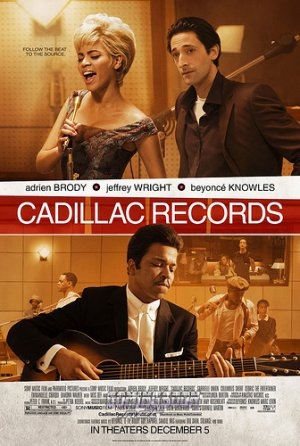 CADILLAC RECORDS (2008, directed by Darnell Martin, 109 minutes, U.S.)
CADILLAC RECORDS (2008, directed by Darnell Martin, 109 minutes, U.S.)
BY DAN BUSKIRK, FILM CRITIC
If you’re born in the rock and roll era it is hard to resist the rock biopic, as shamelessly shaggy as the genre has been. The rise and revelations of the music icon, whether it is Tina Turner, Ray Charles or Johnny Cash is always more giddy than the the grim final act, where the star has to wallow, repent or die. The facts are casually trashed, their lives are hammered into crass trajectories and their craft is often minimized but they usually reach some moment of sublime fascination as some gifted actor receives the opportunity to re-enact one of the last century’s greatest musical moments.
Some of the livelier recent examples are Andy “Gollum” Serkis as the drum-obsessed producer of Joy Division, Martin Hannett in 24-Hour Party People, Marc Anthony’s as the coked-up mess Hector Lavoe in El Cantante and Cate Blanchett as the androgynous Highway 61-era Dylan in I’m Not There. Even as their movies may have been collapsing around them, they all had moments of cinematic euphoria while pairing drama, music and images together in that way only the medium of film can.
Cadillac Records shares many of these films’ shortcomings: it centers around Adrian Brody as the Jewish label owner Leonard Chess, in more than one way the least colorful character on this page of history and it simplifies its story into a tidy little package. Yet when it comes to chill-inducing, major musical moments being brought to life, this film might out-do them all. For a modestly budgeted vehicle, savvy casting and Chess’ stack of ground-breaking records give music lovers a luxury ride.
The weight of the film hangs on the sturdy shoulders of Jeffrey Wright’s Muddy Waters, the living embodiment of the men who brought hollers out of the South’s farm fields and electrified them with guitars in the bars of Chicago. Wright captures a mix of country naivete molded by ambition and a jaw-dropping talent for pouring passion into his music. Wright approximates Waters vocal style if not possessing the sheer power of that gargantuan voice, and when we see him with his band cutting tunes like “I Ain’t Never Satisfied” and “I’m A Man” Cadillac Records really takes flight.
The O.G. in the band is harmonica player Little Walter (a break-out role for Columbus Short). Muddy’s young harp player was the first to distort his cheap instrument’s sound, turning a country hoot into a charging freight train and the mercurial Walter matches the sound’s menace with a pearl handled revolver that he waves around whenever his paranoia demands. He is like a wounded child, whether he’s ready to break down before recording “My Babe” or he is violently ridding the market of a Little Walter impersonator.
You could flesh out an entire movie about these two musical partners but with Cadillac Records the talent just keeps on arriving. Oz’s Eamon Walker takes ownership of the screen whenever his Howlin’ Wolf makes the scene. Always looking ready to pounce, the gravel-voiced and wild-eyed Wolf ogles Muddy’s woman while he howls through the “Smokestack Lightning” session. Mos Def brings his boyish charm to a young and dapper Chuck Berry and finally Beyonce holds court as the angry and tormented blues-belter Etta James. I’m no fan of the myth-making machine around Beyonce yet I was surprised how moving I found her performances of “At Last” and “I’d Rather be Blind.” The Stones briefly show up all wide-eyed as well and for once take a backseat to the originators. Former Blues Brother and top tier session man Steve Jordan is in charge of the music and his spiritually faithful modern recreations of the Chess sound should pass muster with most blues aficionados.
That’s a lot of highlights and the film never even gets to presenting Chess stars like Bo Diddley, Sonny Boy Williamson, Moms Mabley or Ramsey Lewis. The film finally reaches the point where the Chess’ sales flounder and from there habits must be kicked, sentences must be served and tragic fates must be met. While Cadillac Ranch can’t resist being drawn towards predictability, its shortcomings are ultimately dwarfed by the moments when this game cast of actors puts you in that historic little studio as the music that changed the world is being forged in blood and sanctified in sweat.
MUDDY WATERS & BETTY JENNETTE: Mean Mistreater
Live at the 1960 Newport Folk Festival with James Cotton on harp.
